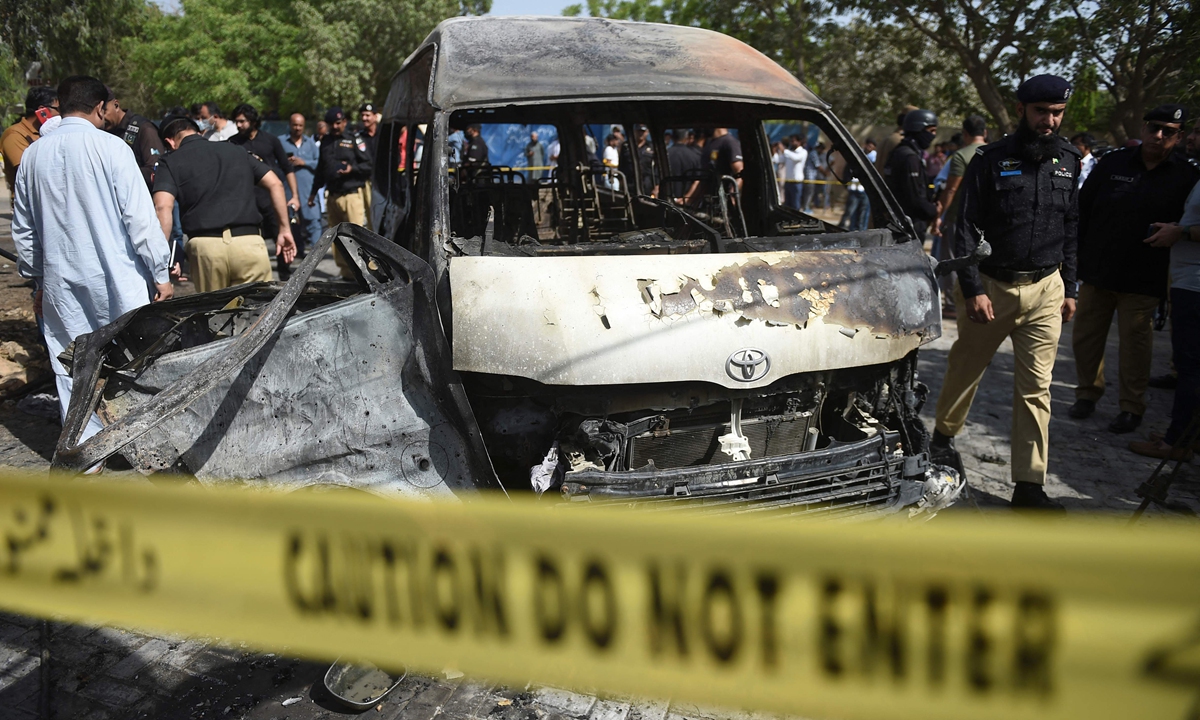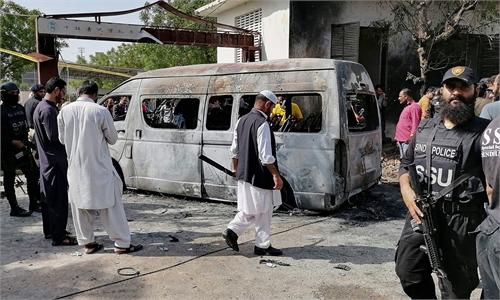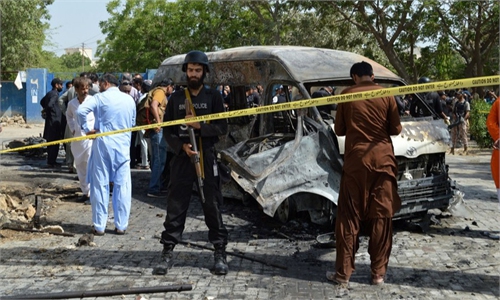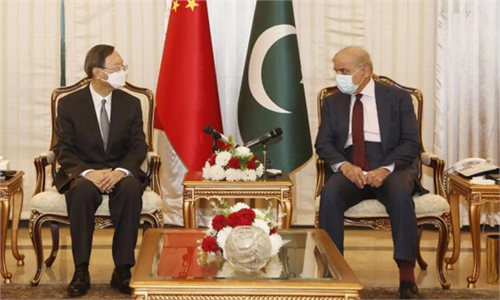
Police inspect a site around damaged vehicles following a suicide bombing near the Confucious Institute affiliated with the Karachi University, in Karachi on April 26, 2022. Photo:VCG
Pakistan has arrested the main suspect of the attack on the Confucius Institute at the University of Karachi, who was linked to two separatist groups in an attempt to sabotage the flagship China-Pakistan Economic Corridor (CPEC) projects, Pakistani authorities announced on Tuesday, adding that foreign forces are suspected of manipulating behind the scenes.
For a case of such complexity, Pakistan's quick handling reflects the importance Pakistan attaches to the security of Chinese nationals, and the incident will not hinder the progress of CPEC in Pakistan but instead will cement the joint efforts of China and Pakistan in fighting against terrorism and enhance cooperation in safeguarding regional security, experts said.
The suspect is a commander of the notorious separatist groups Balochistan Liberation Army (BLA) and the Balochistan Liberation Front (BLF), and the mastermind of the terrorist attack on the Chinese nationals in Karachi, said a Pakistani official at a news conference, China's national television China Central Television (CCTV) reported.
The attack was launched to sabotage the China-Pakistan Economic Corridor projects, and to block foreign investment in Pakistan, said the Information Minister of Sindh province Sharjeel Inam Memon at the news conference, stressing that the government's security agencies will do their best to ensure the safety of all people in the country, according to the CCTV report.
Foreign forces are suspected of having manipulated behind the scenes, Inam Memon said.
The suspect is adept at building improvised explosive devices, he said. Starting 2021, the suspect has been trying to brainwash women and female students into participating in suicide bombings, said the report.
On April 26, a suicide bombing in Karachi, the country's largest city, killed four people including three Chinese nationals, who were teaching staff at the Confucius Institute at Karachi University and a local driver.
Another terrorist attack against Chinese nationals is also linked to the suspect, who had confessed to collaborating with others to conduct recce on two engineers in the Gulbai area that led to a firing attack on them in July 2021, according to Pakistani media outlet Samaa. The incident injured one Chinese national, Samaa reported.
Pakistani officials said investigations on the suspect are still underway.
For such a complex case, the Pakistani government acted quickly in terms of investigating and apprehending, Zhu Yongbiao, a professor at the Lanzhou University's Research Center for the Belt and Road, told the Global Times on Tuesday, noting that the case was not a traditional terrorist attack case, but one that involved masterminds, attack initiators, brainwashing and indirect control behind the scenes.
The ongoing threat to Pakistan's security situation and the BLA's complex structure and operations has added difficulty to solving the case, Zhu said.
Earlier, two suspects related to the attack on the University of Karachi had been arrested.
"The arrest and briefing reflect the importance the Pakistani government attaches to the security of Chinese nationals in that country," Zhu said. "That China sent a delegation to help throughout the process also reflects China's confidence in future China-Pakistan cooperation."
Zhu noted that the Chinese are easily seen as targets mainly because the BLA believes that attacks on Chinese can threaten the Pakistani government they oppose, and that attacks on foreign targets are more likely to draw international backlash than attacks on local targets in an attempt to force concessions from the government.
"However, the security situation for Chinese has improved since the April case," Zhu said. "The Pakistani government has increased its security presence, and China has increased protection, reminders and training for businesses and employees. Affected by the incident, Chinese citizens have also become more conscious of security issues."
In May, Pakistan's counterterrorism authorities arrested a woman who tried to launch a suicide attack on a Chinese convoy.
According to the suspect's confession, he met with the husband of a suicide bomber identified as Dr. Habitan Bashir, and another terrorist Zaib to conduct a successful attack on Chinese nationals at Karachi University, Dawn reported.
Inam Memon said that the suspect has revealed that Zeb was the KU attack mastermind, who entered Pakistan from a "neighboring country" and had been staying in Karachi with Baloch and her husband, according to the Dawn report.
He also confessed that he joined the BLF in 2013 and carried out multiple attacks on security forces in Balochistan's Balgatar area, according to Inam Memon. "In 2022, the terrorist went to a neighboring country and was trained by Zeb in making IEDs at the BLF and BLA camp at the Majeed Brigade's headquarters in Captain Rehman Gul's basement," the report said.
Zhu pointed out that the interference of external forces in Pakistan is a long-standing problem, involving multiple factors from Western countries and India.
"While strengthening the fight against terrorism, the direction of public opinion needs to be guided to avoid negative propaganda," Zhu told Global Times. "China will also work hard to ensure that projects invested in Pakistan can better benefit local people, so that they understand and support China-Pakistan cooperation."
The international community should also be on the side of justice and treat counterterrorism efforts equally without double standards. Countries should stop using support for terrorism or extremism as a political tool, Zhu said.
In a recent interview with the Global Times, Pakistani Ambassador to China Moin ul Haque also noted that Pakistan and China are aware of threats coming from external forces that attempt to undermine China-Pakistan friendship. "We are working together to destroy these forces who are against our future."
China always gives priority to China-Pakistan relations, and is willing to strengthen coordination with Pakistan on multilateral affairs and safeguard the common interests of developing countries, said top Chinese diplomat Yang Jiechi during a meeting with Pakistani Prime Minister Shehbaz Sharif in Islamabad in June.
Shehbaz reaffirmed Pakistan's commitment to enhanced measures for safety, security and protection of Chinese nationals, projects and institutions in the country. Yang and Shehbaz agreed to further strengthen cooperation in safeguarding regional security and counterterrorism.



